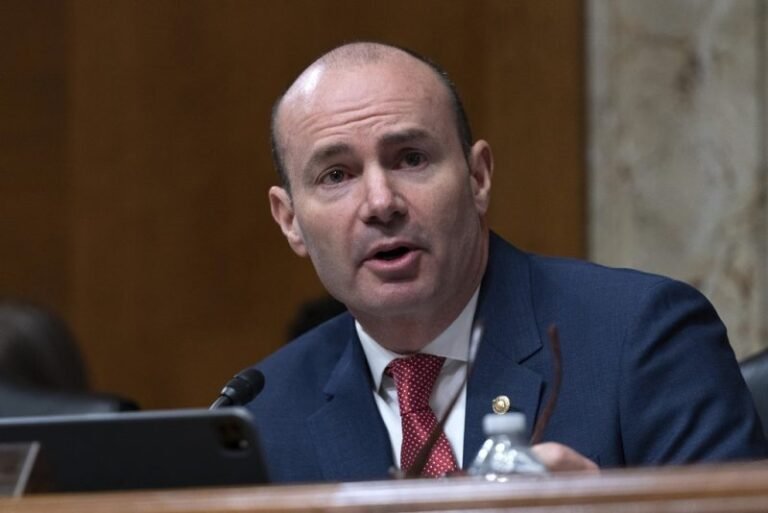
Senate Majority Leader John Thune (R-S.D.) is facing strong pushback from members of the GOP conference over the Finance Committee’s piece of President Trump’s tax and spending bill, which largely ignores GOP senators’ concerns about Medicaid cuts and the quick phaseout of clean-energy tax credits.
Senate Republicans who raised red flags over Medicaid spending cuts the House passed say they were blindsided by the Senate’s version of the bill, which would cut Medicaid by several hundred billion dollars beyond what the House proposed.
They are warning that the Finance Committee’s language will cause dozens of rural hospitals to close in their home states, require lower-income Americans to pay more for medical procedures and shift costs onto the states.
“I had no idea that they were going to completely scrap the House framework like this. This totally caught me by surprise. And I’ve talked to other senators, and that’s what I’ve heard consistently from everybody I’ve talked to,” said Sen. Josh Hawley (R-Mo.), who has repeatedly warned about the impact of Medicaid cuts on his constituents and rural hospitals.
“No one was expecting this entirely new framework,” he said.
Hawley and other Republicans have complained for weeks that the House cuts to Medicaid went too far and called for changes, but those warnings appeared to have little impact on Thune or Senate Finance Committee Chair Mike Crapo (R-Idaho).
Instead, Thune and Crapo sided with conservatives, such as Sens. Rick Scott (R-Fla.) and Roger Marshall (R-Kan.), who called for deeper spending cuts than what the House passed.
GOP lawmakers and aides ascribed Thune’s decision to add even bigger spending cuts in the bill to his sensitivity to the broad desire within the Senate Republican conference for more deficit reduction.
Some Senate GOP sources note that Thune won his contested race to become Senate majority leader in November by picking up more support from conservatives than his chief rival, Sen. John Cornyn (R-Texas).
But perhaps a more important factor in Thune’s decision to move in the direction of deeper Medicaid spending cuts is that one of his top priorities is to make several corporate tax cuts in the bill permanent.
Making those tax breaks permanent requires finding hundreds of billions of dollars in spending cuts to offset the cost and comply with the Senate’s Byrd rule, which does not allow provisions passed under the special budget reconciliation process to add to the deficit outside the 10-year budget window.
The Senate bill would permanently restore immediate deductions for research and development expenses, the 100 percent bonus depreciation for investments, and the EBITDA-based limitation on business net interest deductions.
But now Thune has to find a way to get Republicans who are balking over the Medicaid cuts to support the bill.
Sen. Lisa Murkowski (R-Alaska) told reporters Tuesday she has major problems with the Medicaid language Crapo unveiled.
“I’m still not satisfied with where we are on Medicaid,” Murkowski said, calling it a “priority” she wants to address.
Murkowski has also voiced concern over language in the Senate bill to impose stricter work requirements for Medicaid beneficiaries, according to colleagues familiar with her objections to the bill.
She has questioned whether states like Alaska will have enough time to implement sweeping changes, such as a requirement that adults with dependent children older than 14 show that they work, attend school or perform community service for 80 hours a month.
Sen. Susan Collins (R-Maine) on Tuesday flagged changes to states’ use of health care provider taxes as a major concern for her home state.
Collins said she wants to see “many changes” made to the bill before it comes to the floor.
“This is still a work in progress,” she said. “I’m still asking for many, many changes.”
The Center for Healthcare Quality and Payment Reform reported last month that 10 of Maine’s 24 rural hospitals are in danger of closing.
Hawley on Tuesday warned that nearly half of Missouri’s rural hospitals would face closure if the Senate bill passes without major changes.
“It’s very bad policy, and it hurts poor people,” he said. “It’s not just the right thing to do to shut down a bunch of rural hospitals to pay for tax cuts, or in this case, it’s tax subsidies in the form of Green New Deal subsidies that go to private equity and hedge funds.”
The objections of these senators to the bill’s Medicaid provisions poses a serious challenge to Thune, who already has two “no” votes in his conference against the bill from Sens. Rand Paul (R-Ky.) and Ron Johnson (R-Wis.).
Paul says he won’t vote for the package as long as it includes language to raise the debt ceiling by $5 trillion — a core component of the legislation.
Johnson says the legislation doesn’t do nearly enough to cut the federal deficit and slammed language drafted by the Finance Committee to limit the deduction for pass-through businesses to 20 percent instead of the House bill’s more generous 23 percent deduction.
Thune on Tuesday said he’s willing to work with Collins, Murkowski, Hawley and other Republican colleagues who are asking for changes to the Medicaid spending cuts.
“We are in conversations with all of our members,” he told reporters.
He said that the proposed restrictions on health care provider taxes are “important reforms.”
But he said “we continue to hear from our members specifically on components or pieces of the bill that they would like to see modified or changed or have concerns about, and we’re working through that.”
He said the “math that I’m working with” is to get 51 votes in the Senate.
If Paul and Johnson vote “no” as they’re threatening, Thune could afford only one other Republican defection and still pass the bill. He controls 53 seats in the chamber.
Thune also faces challenges from other Republicans who aren’t happy about the quick phaseout of clean energy tax breaks, which could threaten tens of billions of dollars in investments in Republican-represented states.
Sen. Shelley Moore Capito (R-W.Va.) said she’s not happy about language in the bill that would terminate the clean hydrogen production tax credit for projects that are not under construction by Dec. 31. That threatens significant federal support for the Appalachian Regional Clean Hydrogen Hub in West Virginia.
“I’m concerned, I’m just going to grab Crapo in there right now,” Capitol said while heading into a Republican lunch meeting Tuesday. “I think I’m concerned about it.”
Capito is the chair of the Senate Republican Study Committee and a member of the GOP-elected leadership.
She said she wanted to hear more from constituents in West Virginia about how the Medicaid cuts would affect them.
“We’re talking to the governor and others in office to see what kind of impacts this will have,” she said.
Sen. Jim Justice (R-W.Va.) told reporters Tuesday he also has concerns about the bill’s changes to health care provider taxes and would not be a “rubber stamp” for the legislation.


